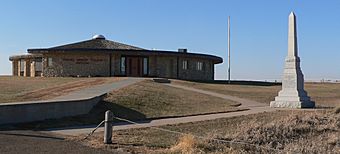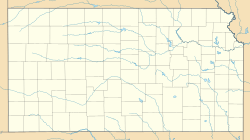Pawnee Indian Museum State Historic Site facts for kids
Quick facts for kids |
|
|
Pawnee Indian Village Site
|
|

Museum and restored 1901 monument
|
|
| Nearest city | Republic, Kansas |
|---|---|
| Area | 11.2 acres (4.5 ha) |
| NRHP reference No. | 71000325 |
| Added to NRHP | May 14, 1971 |
The Pawnee Indian Museum State Historic Site is an important place in Kansas. It is an archaeological site and a museum. You can find it near the town of Republic. This site is listed on the National Register of Historic Places as the Pawnee Indian Village Site. It helps us learn about the history of the Pawnee people.
Contents
The Pawnee People and Their History
This site holds the remains of a village. It was once home to the Kitkehahki, also known as the Republican band of the Pawnee tribe. The Pawnee are a group of Native Americans. This village is one of four Kitkehahki sites found in the Republican River valley.
The Kitkehahki lived in the Republican valley at different times. They were there from the 1770s to the 1820s. We don't know the exact years this specific village was used.
Pike's Visit to a Pawnee Village
In 1803, the United States bought a huge area of land called the Louisiana Purchase. Both the U.S. and Spain wanted control over this land. They both tried to make friends with Native American tribes, including the Pawnee.
In 1806, a U.S. Army officer named Lieutenant Zebulon Pike explored the area. He visited a Pawnee village. A large Spanish group had just left that village. Pike convinced the Pawnee people to take down the Spanish flag. He then had them raise the flag of the United States instead.
Protecting and Studying the Site
In the 1870s, a woman named Elizabeth A. Johnson became very interested in Pike's flag story. She found this village site in 1875. After studying Pike's notes, she thought this was the village Pike had visited.
To keep the land from being plowed and damaged, Elizabeth and her husband bought it. In 1901, they gave the site to the state of Kansas. This was done to protect it as a historical place.
The Monument and Its Story
The state of Kansas spent money to put a fence around the land. They also built a large granite monument. This monument was 26-foot (7.9 m) tall. It was built to remember the 1806 flag event.
At the dedication ceremony in 1901, speakers talked about Pike's success. They compared it to America's recent win in the Spanish–American War. In 1906, a four-day celebration marked 100 years since Pike's visit.
Later, researchers discovered that Pike had visited a different Pawnee village. That village is now called the Pike-Pawnee Village Site in Nebraska. However, Elizabeth Johnson's mistake was a lucky one! It led to the protection of this Kansas site. The Nebraska site, sadly, was damaged by farming over the years.
Digging Up History
Archaeologists studied this site several times. They did some work in 1933, 1949, and 1957. More detailed studies happened from 1965 to 1968.
In 1967, a museum was built around one of the ancient earth lodges. An earth lodge was a type of home the Pawnee built. After the museum was built, the lodge was carefully dug up. Many artifacts were left in place for visitors to see. The Kansas Historical Society now runs this museum.
In 1971, the Pawnee Indian Village Site was added to the National Register of Historic Places. This means it is recognized as a very important historical location.
The Monument's Restoration
A powerful tornado damaged the 1901 monument in 2004. Because it is a historical structure, it was repaired. However, it was not rebuilt to its exact original height or look.
Images for kids
 | Georgia Louise Harris Brown |
 | Julian Abele |
 | Norma Merrick Sklarek |
 | William Sidney Pittman |




